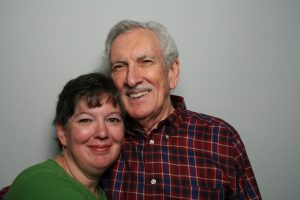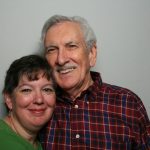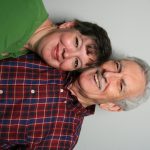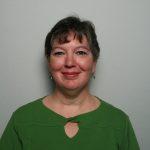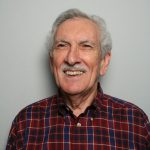James Wallace and Kristen Pierce
Description
Kristen Pierce (44) speaks with her father James Wallace (74) about his life and times as an engineer.Subject Log / Time Code
Participants
- James Wallace
- Kristen Pierce
Recording Locations
Atlanta History CenterVenue / Recording Kit
Keywords
Subjects
People
Places
Transcript
StoryCorps uses Google Cloud Speech-to-Text and Natural Language API to provide machine-generated transcripts. Transcripts have not been checked for accuracy and may contain errors. Learn more about our FAQs through our Help Center or do not hesitate to get in touch with us if you have any questions.
00:05 Good morning. My name is Kristen Pierce. I'm 44 today is October 15th 2013. I'm here in Atlanta with my dad. James are my name is James Wallace? My age is 74 today's date October 15th night 2013 location Atlanta and I am speaking with my daughter.
00:36 And we're here today to celebrate. My dad's upcoming 75th birthday and I just have some questions for him because I thought would be nice to record nicely. I wanted to ask him about growing up and what life was like for him if he was grown up and going through school so Dad. Can you tell me about what it was like in your your high school with your friends and teachers when her and I would like for you to elementary school to start with I think it's to understand my life. It is important to know what happened that first September when I was in the first grade, I was 5 years old and that September
01:29 One day I heard the fire siren go off. We were we lived in a small town Magnolia Arkansas in the southwest portion of the state. But anyway, when I heard the fire siren go off, I knew that that was calling the volunteer firemen to go fight a fire until I went to the window of my Kinder first grade class looked out to see if I could see the smoke which just what I used to do when I was a child because I knew my father was one of the firemen
02:08 I did not see any smoke. I went on through school that day. And then that that evening. I learned that my father had been seriously burned as he was fighting the fire and during that evening. He died leaving my mother with four children. The oldest of which was at Georgia Tech as a member of the Navy he this was score still during the second world war, but my two sisters one of which is 8 years older the other than 10 years older were there with mother.
02:57 And following the loss of my father that made a major change in our lives. My mother had to go to work and she had never worked outside the home before and my name my dad's name was James Carl Wallace and I was actually named after his father. His father's name was James Robert Wallace, which is the same as mine. And so as of today, there are five generations now of James Wallace's because I have one grandson that's named James Wallace The Hub but and so the guy that tell the story about my my father's death and the fact that the mother took over the
03:55 Responsibility for the children with the somewhat to exception of my brother.
04:02 But everyone all the all the both the sisters needed to go to work. We had to move from our house that we lived in because the rent was $35 a month and that was more than we could pay. So we moved into an apartment on the other side of the tracks and live there for the next several years. And so that's how my that's that's about the first thing I can really remember clearly in my life some some other minor things are playing in my sandbox and so forth when I was a child, I I remember but I am getting back to look at the question you you asked about the
04:54 I have WhatsApp what it was like being School the elementary school was just immediately across the street from the house that we lived in when my father died, but then it was we moved to another to the apartment that was on the same street that on the other end. And so I had maybe a half a mile to go to elementary school. And I don't remember too much about elementary Stewart playing in the play yard the swings in the Merry-Go-Round and things like that.
05:39 Your sisters had to go to work bright. Yes. Well, yes. I I started my
05:49 Work career
05:52 I was probably eight years old maybe 7 something like that and on the Square the town of Magnolia. What's the county seat? So do they Courthouse was there in the Square built around it where most of the commercial retail operations were there was a bakery and next door to the bakery was the movie and on Saturday people came in from the countryside to go by there flour and sugar and coffee and things that say they only came into town maybe once a week or once every couple of weeks many of them still came in and their wagons horse-drawn wagons. But at one of the things they like to do was go to the movie and they would line up to go to the movie and the line to buy the tickets went past the the bakery show Linda and so my first
06:52 Job was sitting in the show window on Saturdays eating the various products of the bakery to to make the people that were lined up to go to the movie hungry and I want to become an experience that time those good tastes that I was enjoying while I was sitting in the show 1.8 pastry cakes Donuts. Yes, all kinds of things. In fact for the afternoon to work not only did I get to eat those things but I got that $0.50. So that was a that was a good job. I had several other jobs said that one of which was delivering laundry.
07:42 One of our friends in our church had had polio and so he was had them some crippling associated with that which made it hard for him to climb stairs. So he hired me to go with him. He would to deliver those packages of laundry in those situations. We had to climb stairs. Like somebody might be living on the second floor above apartment or something like that. And so he would get me after school or Saturday and pick me up in the delivery truck and we would go to the homes and he would say take this package and go up and deliver it to that place than that. So that was my that was my next job part-time and then I started a regular the afternoon paper route for the local paper the Magnolia Banner news, and that was the kind of job.
08:42 Where I had to I had to buy the papers and then go to each of the customers each week and do my best to collect from them get enough money to pay for the papers and maybe have a little left over for myself. And that was a quite an interesting thing. I had well over a hundred customers that I had to get to to collect from and on a good week. I made $5 and that took me a couple hours every afternoon after school and pretty much all day Saturday collecting. So I have two or three other jobs that I'd like to mention. I've a graduated from the afternoon paper to the morning paper delivering that when I I got up at 4:30 every morning and went to pick up the paper which came from Little Rock cruise to the Arkansas Gazette.
09:42 And I got delivered that in the benefit of that the job was I didn't have to collect and then one summer when I was in high school. I Spent My Summer in Houston, Texas working for my brother-in-law's Lumber Company and that job was mainly stacking and delivery and unstacking and going on deliveries for trucks of lumber to a loading and unloading and unloading boxcars full of Lumber in a net that kind of thing.
10:21 And then I guess the final job. I'll mention while I was in high school was working on that one summer working on the county road crew.
10:33 Which was basically helping very manual labor with the asphalt truck would drive down the street spreading the asphalt and then there would be a truck come behind it with the gravel and it was my job with the big broom to come along and smooth that gravel out how much hot asphalt in the summer in Arkansas. So that was that was a lot of fun. So that's basically maybe more than you wanted to know about jobs growing up but the responsible
11:14 Jennifer do anything wrong in high school and roll sounds like a really hard worker. But well, they only the only the only thing that comes to mind is the
11:37 The time that one of my good friends Kenny Dalrymple and I
11:47 Deposited item in our solid geometry class C geometry teacher had suspended various different shapes cones cubes cylinders that so forth from strings from the from the ceiling of the classroom just to illustrate the different to the geometric configurations. There was a old military recruiting station that had a bout to front of their office. They had a Sign by the sidewalk and underneath that sign there was
12:39 Something that had been made to look like a bomb. It wouldn't have I moves may be 2 to 3 ft long versus eyes look just like a bomb but it was made out of light metal and so one evening, my friend and I unhook that bomb from that site scale the outside wall up to the second floor of the high school open the window went in and Patch the bomb to the ceiling of the room nowadays, that would probably get us put in the penitentiary but I've been dead. Yes, but in those days it it didn't but that when our teacher came into the classroom that morning she did scream dropped or Coca-Cola and went to tell the principal but as far as I know there was never any identification of who who did that. So that's
13:39 That's the thing that comes to my head that I probably wouldn't want them to to repeat.
13:49 At Georgia Tech
13:52 Well you end up being a civil engineer, answer the question about Georgia Tech first.
14:03 My brother joined the Navy when he was a senior in high school and he was in the I think it's called the B12 program at the time but it was a program in which the Navy sent Young promising my brother Billy Wallace they sent them to to to school to get an engineering degree to help out the their needs in that branch of the service. And and so I knew of Georgia Tech because he had been a student there and had obtained an electrical engineering degree from there. The other thing that I knew about Georgia Tech was that it had a co-op program and if I was going to college
14:55 I had to pay my own way. I had to find some way to to pay for the no no. No, we didn't have any money. And so I found out that if you were admitted to the co-op program you worked for three months you went school for three months alternately that way through the first four years and then you went your final year straight through finished in five years. And so I applied for the the co-op program and you had to make a certain grade white your first quarter in your in your Scholastic studies.
15:39 And at the end of my first quarter at Tech I
15:47 Had made the adequate grades and I was giving a good job. And so that's the to answer your question about. How did I get there? I got there on the Greyhound bus, but I got there because I knew about the school because my brother been there and I went there because I had to find some way to pay for their college education. So why would I did go through the entire. For the co-op students and finish my
16:24 Did you work during this 3 months? Well, I had my first assignment was in Abbeville Louisiana the co-op office at Georgia Tech the official there just said you're going to work for mobile or cut me and you have to call this name. Who's this number and the office is in Abbeville, Louisiana course. I had no concept of bread Deville Louisiana was but I got a map and found Abbeville, Louisiana and call the train station find out how close I could get to Abbeville on a train found out I could get to Lafayette, Louisiana on the train and then I need to catch a bus to Abbeville. So I made all those arrangements got there and found out that the crew that I would be working on would be working in the Gulf of Mexico.
17:24 And that the work would be seismic exploration or geophysical exploration which basically means that we would be mapping the subsurface geologic structures in which oil could be expected to be found and it was on the basis of that kind of exploration that the subsequent of big development of the oil production feels in the Gulf took place. So I worked out of Abbeville Louisiana work out of Morgan City, Louisiana, Port Lavaca, Texas all of those in the Gulf of Mexico.
18:11 And doing geophysical exploration and then I was transferred to a land base crew that worked in swamps. Basically, what we were doing was tying the information from the the offshore exploration into the the shore so that we could continue mapping these geologic formations and his old that was that was my work and I continue to work across the the Gulf Coast near the coast through three different towns in Mississippi one and Alabama and I ended up my last term working in Pensacola, Florida so refinishing
19:04 Your undergrad attack and you had done your five years you had become you know, if you're working as a civil engineer while going to school. How did you decide to go on to graduate school? And you know, how did you end up fit a mighty? Well that was growing up poor that had finally figured out how to get the college and work your way through college. I would have to say that my
19:43 Continued success as it were in the academic world would not have happened without the encouragement of one of my faculty here or maybe more than one of my faculty members, but one of my faculty advisors was dr. Paul Mayer at Georgia Tech in the civil engineering department. And as we were approaching graduation time for the undergraduate degree, he said that in his opinion, I should go ahead and go finish. My Master's Degree there at Georgia Tech and he said Not only would he recommend this but that he could provide a job and a research project that I could work on. That would become my masters.
20:43 Thesis and that he would through a project that was sponsored by the US Geological Survey. I would become a part-time employee of the US Geological Survey while I was a student there. They would pay me a salary to do this research. No. That mean if I had
21:11 Dr. Mayer and one other Professor doctor Carl kins water were very instrumental in my Works in emphasis on the water part of civil engineering which means hydrology fluid mechanics Hydraulic Engineering those those kinds of things which I had been interested in since childhood. I can remember building little streams and dams and thinks that I was still a preschool-age but through his encouragement and not only encouragement but making it. Offer that it was hard to refuse.
22:04 I continued on there at the Georgia Tech for another year and completed my master of science in civil engineering.
22:15 And then again when I and dr. Mayer was my back of the advisor on the my the Master's thesis and as we were approaching graduation again, he said I think that you should go.
22:35 For your doctorate in
22:38 Civil engineering and I'd never considered this but it was through his encouragement and that that I pursued this and I said to him, where do you think I should apply and he said well, I think you should apply to MIT.
22:56 And so I thought that well it was it was late in the year and all of the assistantships and scholarships would have been given out now, but because I'd had such good luck with him and he was such a trusted adviser. I went ahead and sent my application into MIT.
23:17 And surprisingly got this letter back from the civil engineering department at MIT and they said you just the guy we're looking for we would like to offer for you a teaching assistantship in the school of civil engineering and the field of hydraulics and hydrology.
23:39 And so I said, okay and again I packed my little trunk up and
23:48 I don't remember applying anywhere else and I went up and moved into the dormitory up there to graduate to the dormitory on Massachusetts Avenue just at the end of the Harbour Bridge and started doing the the teaching assistantship jobs, which met primarily grading homework in and test papers, but occasionally assisting with a lecture or when maybe one of the professors I was working for and I was working for five or six of them would be gone for a day or two. I would get a chance to maybe give one lecture every now and then and after 2 years of that.
24:37 I had it had another opportunity because I had not finished.
24:42 I had finished my courses, but now I needed to have moving into the research part of the of the program and I found out that the school.
24:56 Had been granted
25:03 Well at least had received a grant from the Department of State which was under the inter-american program put your something that had been initiated by President Kennedy and that was gave money for research at u.s. Colleges universities. They had they had to do something in conjunction with a university in South America.
25:40 And so my area of research then under that Grant was to work on methods for mathematical optimization of the allocation of water. I can get back to that. But let me say that there was a
26:09 That's as part of this. I had to do part of my work in Chile. Now that was in China, but the connection between MIT and University of Santiago Chile. And so I had the theoretical foundation of the mathematical optimization of Water Resource allocation, and I went to Chile and got data to to use in this from a River Basin in Chile had to go to the you know to the National Archives and then what would be equivalent probably to the Geological Survey in in the United States and my
27:09 Cheap professor at MIT and then put on Short Course in the University of Santiago where people came and we talked to them about this this kind of Water Resource optimization schemes. And so that's how I financed my
27:33 My education through first two years of
27:38 I've researched no, excuse me, teaching assistantship and then the last year-and-a-half with a research assistantship.
27:49 And it was during with about six months No, 3 months to go probably 3 3 to 6 months to go on my research at the end of 1965 that the telephone in my apartment at MIT running one night, and it was dr. Fred shoots calling from the Department of Civil Engineering at Georgia Tech. And he said the gym we would like for you to join the faculty at Georgia Tech if you could come starting the first of January 1966.
28:34 We know that you are still working on your dissertation will let will will pay you a salary. You can finish up. Are you working on your dissertation and also prepare for your first quarter of teaching?
28:48 And so I made some me laugh explain to him. I probably have to go back up there a couple of times to do some more computer runs and so forth on my dissertation and he said that was fine and that I would have to go back for my final exam on my dissertation and he said fine we take care of that so
29:10 That's if during the the winter break at the ended ended December in 1965. I moved back to Atlanta and moved into an apartment right down here about apartment. But the second floor of a house a residence right down here off of Piedmont at the Eliot Circle and lived there for a while and had bedtime. Anyway, that's and then I want success and finishing my doctoral program on schedule at the MIT. And for the next thirteen years. I was a professor of civil engineering at Georgia Tech.
29:59 So that sucked.
30:04 Have three kids
30:06 Raceland go to church and
30:10 Joanna I took professional organizations
30:16 Yes, the first child oldest son James Daniel Wallace was born in Boston in 1965. Just a few months before I left there and the next two children were born just a few years later Second Son being Paul Matthew Wallace and then my famous daughter Kristen was was born there and you know, we still live in the house where Paul and Kristen were born so
31:03 I mean that the teachers that Professor is that she mentioned.
31:10 Helps you imagine more of a future.
31:17 When you were thinking about what you would do that then you know, if they put the idea of getting a master's and getting a doctorate and to your head and kind of expenditure Horizon fun. And then you are a teacher you were broken up for the students that you had that you ever help Mentor them or give them the same kind of hope for the future.
31:43 Well, I I have many students that have going on to be successes and mention just a couple of them.
32:02 Okay, the one that I would like to mention his name is Larry Neal. He was a good graduate student that worked with me on the research at Georgia Tech have a couple years after he got his master's degree. I hired him to work for me at law engineering and I'll get back to how that happened in just a minute but time.
32:28 Larry was a very good student and a hard worker and smart guy and he is still working with the company and I ever bring his name up because some of the concepts that we worked on when he was a graduate student in 1968. He recently applied to the harbor deepening project in Savannah. I think many people in Georgia South Carolina, maybe the southeast know about the the harbor deepening project. It's been a controversial project in one of the main areas of controversy who's been that there would not be enough oxygen in the Stream if it were.
33:23 Deepened and based on things that Larry had you learned both as a graduate student and subsequently.
33:34 The allowed him to know how to replenish the ocular the oxygen in the harbor and as a result of that.
33:46 The harbor
33:48 Deepening approval based on environmental issues got passed. So I would say that to Larry has made a tremendous contribution to the the state for Georgia the economy and so forth another name that I'll mention is that the work on the same project with Larry Neal is heraldry Heise who went to work for the Georgia Environmental Protection division when he graduated with his master's degree, and he subsequently became the director of the Georgia Environmental Protection Division and as such had responsibility for all the Environmental Protection issues in the state of Georgia and made a very considerable contribution to the well-being of the environment in your words are so those are those are a couple that I'll mention
34:46 I'll let me mention one other thing that I mentioned that I had hired Larry soon after I became a member of The Faculty at Georgia Tech. I received a request from one of the other faculty members Professor George Sowers who was a internationally known expert in geotechnical engineering.
35:20 But he was also the chief engineer.
35:25 For the for law engineering testing company
35:29 And I he asked me to get involved with him in a big litigation that was going on and down in Southern Mississippi at the facility where they test the Saturn booster Rockets. This was when that Rockets were first coming on and so I I did agree to help him with that looking at issues about groundwater, which were they the points in contention and because of some work I did we we won very decisively that litigation and so that started a long career of working as an expert witness in litigations, and then also led to the
36:26 Subsequent hiring Myself by law engineering after 13 years of Georgia Tech be the request for a consultation on projects not just for the ocean, but that a lot of in the early 70s safety analysis from the flooding and drought. So for safety analysis of nuclear power plants are being constructed helping obtain the license for the nuclear power plants nuclear waste sites that sort of thing then So eventually it got to the point where I had to make a decision between so I could work full-time at both jobs. And so I wasn't really enjoying working with consulting firm. So I resigned my position that to Georgia Tech in
37:26 Spent the rest of my career with law engineering and its subsequent names than that. So that's where I have spent the last 30 years of my professional life retired when I was 65 in 2003. And as I said jokingly somewhat but not too much jokingly to some people I cut back to 40 hours and I continue to work as a part-time in the consultant to the floor engineering and have done that with diminishing a level of effort over the subsequent in years.
38:15 But you've also been a consultant for your son, right?
38:20 . Son Daniel Day on his we call him when he graduated with his civil engineering degree from Georgia Tech. He moved to Macon Georgia and after a few years with working at another firm. He started his own company and from time to time. I have worked with him as a consultant. And in fact, he called this morning and asked me to go to a job site with you today, and I said I can't I have and I have to be with your sister so
38:55 And we might also would you like for me to mention your brother Paul?
39:03 Whelmed your your brother Paul is an unusual person as you all are but he's a he has a doctorate in astrophysics from the Duke University, and he has taught at his work for NASA. He started at Berry College for 10 years and became head of the physics department there before he resigned that night. I said tenured position about five years ago and became a student again at Candler School of Theology at Emory at which time he learned his master's degree in Divinity. And so now he is this term he's teaching physics at Agnes Scott and theology at Candler.
40:02 So that sucks and of course, I want to mentioned what my daughter is is doing now to pick kind of round out the family. She is after starting as a theater major graduate from Berry College found out that one going to work too well for her home being a wife and mother and so after kids got a little older she went became a emergency medical technician and that's where she is still working which so
40:40 I think we're just about all the time and I want to thank you Dad for coming today and Sarah and all of your story and I love you. I love you for asking me and I love you for many reasons, but Santo thank you, and it's been a good day.
41:04 My mother's name. Maiden name was owner Arena Arena price.
41:15 And your sisters names my sister. My older sister name was Mary Alice.
41:26 Second sister was Betty Lou.
41:31 And my brother was Billy Carl got him, okay?
41:37 Thank you.
